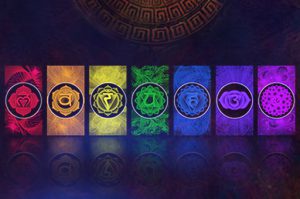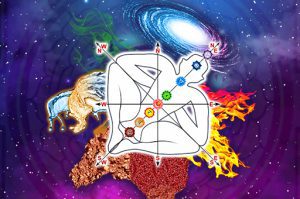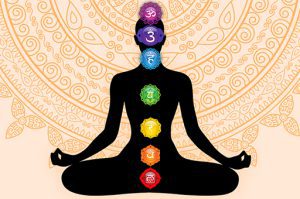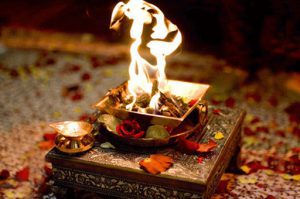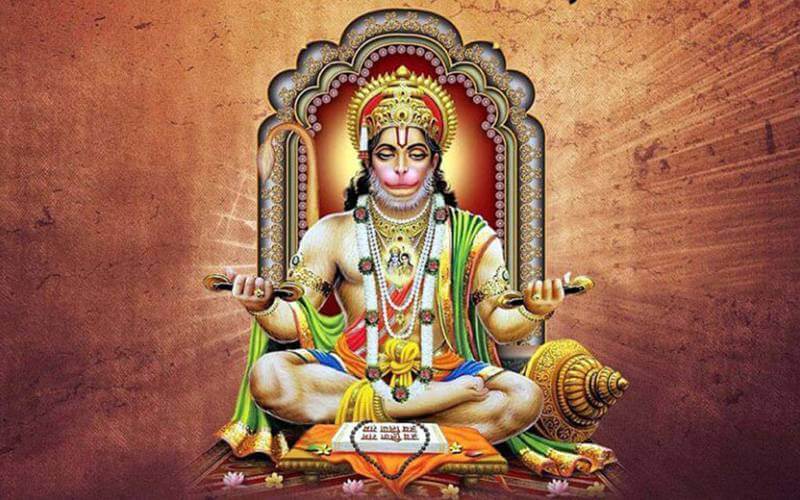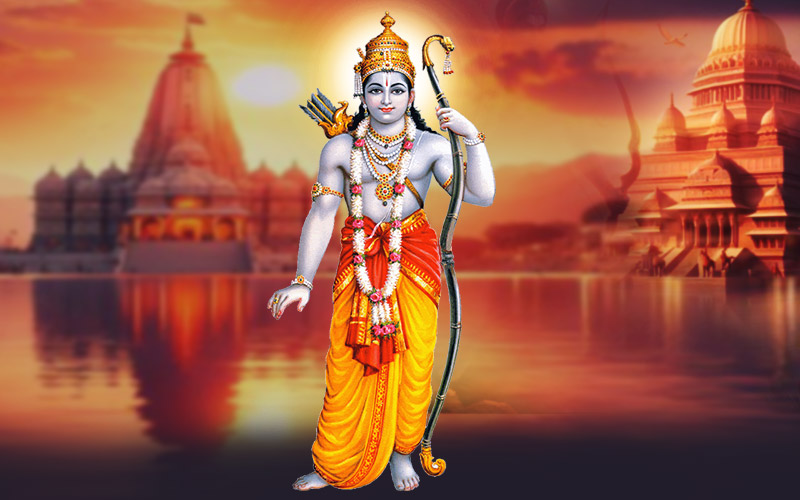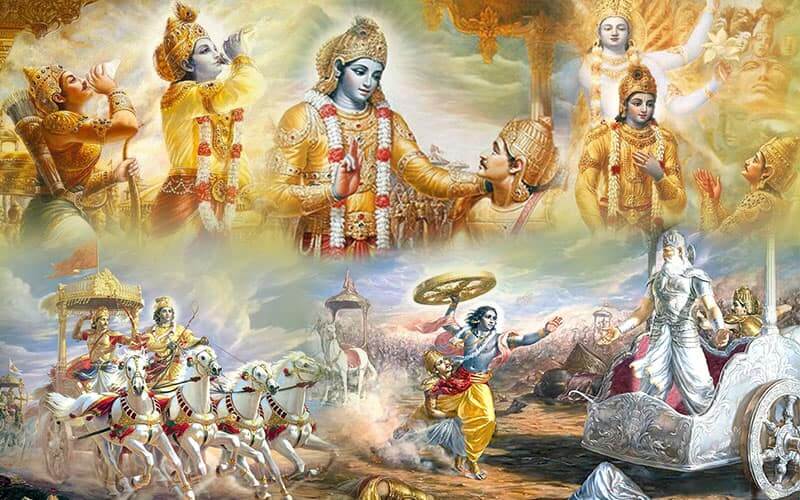
The Heart Chakra is the seat of Dharma or righteousness. You can utter a lie with your tongue, but your heart opens only with truth, and that truth is your dharma. This applies to everyone. Consider the unease in your heart when you have done something you know inwardly to be wrong. Your heart is uneasy because it knows where your Dharma lies. Dharma is the path of virtue that lays down duties, laws, rights and rule of conduct for the right way of living. Life on this earth is upheld and sustained only through Dharma. As the human race evolves, Dharma too has evolved along with the people and the changing society. In the Bhagvad Gita, Lord Krishna promises Arjuna that whenever and wherever there is a decline of virtue, he will manifest on this earth to preserve and uphold Dharma. Krishna was speaking from the battlefield of Kurukshatra, the epitome of a Dharma Yudh fought by the Pandavas to establish righteousness in the world.
Dharma in the middle ages was redefined in the epic Mahabharat. From their childhood, the Kauravas had orchestrated evil schemes against their cousins, which only grew in cunning in later years leading to the war. The old King Dhritarashtra and his wife Gandhari gave their sanction to this Adharma by turning a blind eye to their sons’ deeds.
We can infer that it was a time when people did not have a clear understanding of Dharma. In such a time, the Pandavas, under the guidance of Krishna, fought the Kurukshetra war to establish a new meaning of Dharma. The battle of Mahabharata was significant in that it redefined Dharma for the coming ages.
Know that Dharma wants surrender to the highest truth as opposed to control of life due to ego. Before the Great War, both Duryodhana and Arjuna had rushed to Shri Krishna to seek his help. Both arrived in the sleeping Krishna’s chamber simultaneously. Duryodhana who sided with Adhrama chose to sit near the Lord’s head, while Arjuna followed his dharma and sat humbly at the Lord’s feet. When Shri Krishna awoke, he asked them both what they wanted. He offered his Narayani army to one side and his lone self to the other. Adharma is greedy and therefore Duryadhona chose Shri Krishna’s massive army, while Arjuna happily chose the unarmed Krishna to be by his side.
During the game of dice, the actions of Yudhisthir the eldest Pandava may look cowardly and irresponsible. In reality, he was acting in accordance with the Kshatriya dharma. Despite his foreboding, Yudhisthira was forced to sit through the game of dice because he could not ignore the Kshatriya dharma, which lay down that a warrior cannot refuse a challenge. In following his dharma, he could not opt out of the game even after losing every round to Shakuni. Until the time he owned something and could bet on it, Yudhisthir was forced to play on.
Mahabharata demonstrates that Dharma is above everything. In the battlefield, when Arjuna grew weak at the sight of his clan and refused to fight them, Krishna stepped in. Like people of his time, Arjuna was affiliated to the laws of family, society, throne and King. Arjuna’s cowardice is partly attributed to the fact that he was being guided by the ties of kinship and society, which made him queasy about lifting a weapon against his elders. Krishna briskly tells him to ignore all societal laws and kinship ties. He urges Arjuna to follow the truth and live his true Dharma as a Kshatriya. He tells Arjuna: “You have a right to perform your prescribed duty, but you are not entitled to the fruits of action. Never consider yourself the cause of the results of your activities, and never be attached to not doing your duty.”
In spite of all his talk about Dharma, a few days into the war, we see Krishna resorting to trickery and treachery to eliminate key Kaurava warriors on the battlefield. On the 14th day, Krishna had to work his magic and turn broad daylight into night-time darkness to bring Jayadratha out of hiding so that Arjuna could kill him. Krishna’s facilitating the killing of Jarasandha was crucial on two counts. Had Arjuna not been able to kill Jayadratha before sunset that day, he would have been duty-bound to immolate himself as he had vowed. Secondly, Jayadratha was the prime cause of Abhimanyu’s death and Dharma demanded that he had to be killed. Anticipating this, the Kauravas had thrown their circle of protection around Jayadratha, making him inaccessible. Only someone like the Supreme Lord could have brought him out of hiding.
Throughout the Mahabharata war, Duryodhana suspected the loyalties of Bhisma, the family patriarch. He was in the habit of visiting his camp and berating Bhishma, even accusing him of not doing enough on the battlefield. From Duryadhana’s conduct it is clear that Dharma is hard to establish when one is full of control, suspicion, doubt, anger, spite and hatred.
The story of Karna who wilfully sided with Adharma, is a study of emotions. Although he was a Pandav, Karna chose to align with the other side because he was overcome by emotions. Adharma rises because of emotions while dharma comes into play only from love and trust, which arises from a state of peace.
Time and again, both sides are found violating the code of conduct in this Dharma Yudh. The Kauravas did it blindly in their desperation to win the war. Urged by Krishna, the Pandavas also bent the rules, but were questioned each time since they were supposedly on the side of dharma and were expected to refrain from deceit.
An instance on the 17th day was the killing of Karna, a warrior who matched up to Arjuna in every way. In addition to his superb skills, Karna had powerful astras from his Guru Parashuram. In order to prevent Karna from routing the Pandava army completely, Krishna commands Arjuna to kill him at any cost. In the ensuing duel, Karna’s powers are almost too much for Arjuna. Seeing that Arjuna had no answer for Karna’s Magastra, Krishna had to sink his chariot a few inches into the earth, so that the divine weapon only hit Arjuna’s crown instead of his neck.
The wheels of karma were already beginning to turn against Karna on that day. His chariot was sinking into the earth and his memory was failing him. He could have invoked the Bramhastra against Arjuna’s arrows, but his Guru’s curse comes back to haunt him. He pleads with Arjuna to give him some time as he needs to take his chariot wheel out of the mud. He can fully combat Arjuna’s arrows if only he can remember the mantras. All he needs is some time. “For the sake of dharma, you must give me time. You are the world’s best Archer. If you kill an unarmed warrior, history will laugh at you.”
Krishna knew that a fully-functioning Karna would be very hard to eliminate and pushes Arjuna to kill the unarmed Karna with the logic that even holding the chariot wheel is holding a weapon as it had the power to kill. Krishna’s policy that evil must be wiped out, even if it meant resorting to creating illusion in the mind of the enemies echoes throughout the battle.
The Kauravas led by Ashwathama raided the Pandava camp at night and slaughtered their sleeping kin including Dhrishtadyumna, Shikhandi, Yuddhamanyu, Uttamaujas and even the sleeping Upapandavas. This midnight slaughter was another mockery of the code of war.
Yudhisthir’s lie about Ashwathama being dead is another instance of trickery of words that was allowed, given the circumstances that Dharma has to have an edge over Adharma.


